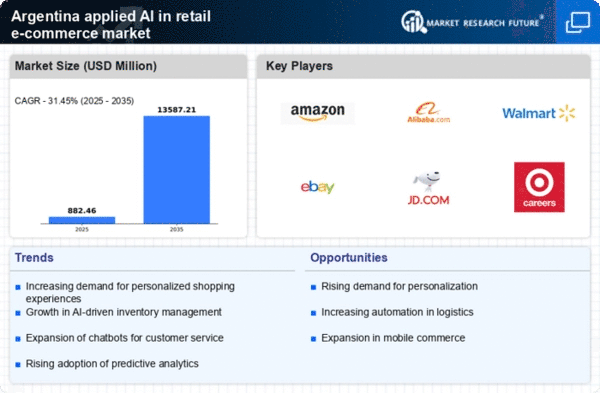Cost Reduction Strategies
Cost reduction remains a critical driver for the applied ai-in-retail-e-commerce market in Argentina. Retailers are increasingly turning to AI solutions to minimize operational costs and maximize profitability. For example, AI can automate routine tasks, reducing the need for manual labor and thereby cutting labor costs by up to 25%. Additionally, AI-driven supply chain optimization can lead to significant savings in logistics and inventory management. As businesses strive to maintain competitive pricing, the implementation of AI technologies becomes essential for achieving cost efficiency. This focus on cost reduction is likely to propel the growth of the applied ai-in-retail-e-commerce market in the coming years.
Growth of Mobile Commerce
The growth of mobile commerce is a transformative driver for the applied ai-in-retail-e-commerce market in Argentina. With an increasing number of consumers using smartphones for shopping, retailers are compelled to optimize their platforms for mobile users. AI technologies play a crucial role in enhancing the mobile shopping experience through personalized recommendations and streamlined payment processes. Data indicates that mobile commerce is expected to account for 50% of total e-commerce sales in Argentina by 2025. This shift towards mobile platforms necessitates the integration of AI solutions to cater to the preferences of tech-savvy consumers, thereby driving the expansion of the applied ai-in-retail-e-commerce market.
Consumer Behavior Insights
Understanding consumer behavior is crucial for the applied ai-in-retail-e-commerce market in Argentina. Retailers are leveraging AI to analyze shopping patterns and preferences, which allows for more targeted marketing strategies. Data suggests that 70% of consumers in Argentina prefer personalized shopping experiences, which can be effectively achieved through AI analytics. By utilizing machine learning algorithms, retailers can predict trends and adjust their offerings accordingly. This capability not only enhances customer satisfaction but also drives sales growth, as businesses can tailor their products and services to meet the evolving demands of consumers. Consequently, insights into consumer behavior are a significant driver for the applied ai-in-retail-e-commerce market.
Integration of AI Technologies
The integration of AI technologies into the retail e-commerce sector in Argentina is a pivotal driver for the applied ai-in-retail-e-commerce market. Retailers are increasingly adopting AI solutions to enhance operational efficiency and customer engagement. For instance, AI-driven analytics tools enable businesses to process vast amounts of data, leading to improved inventory management and demand forecasting. In 2025, it is estimated that the adoption of AI technologies could lead to a 30% increase in operational efficiency for retailers. This trend indicates a growing reliance on AI to streamline processes and optimize resource allocation, thereby fostering a more competitive landscape in the applied ai-in-retail-e-commerce market.
Enhanced Data Security Measures
In an era where data breaches are prevalent, enhanced data security measures are becoming increasingly important for the applied ai-in-retail-e-commerce market in Argentina. Retailers are adopting AI-driven security solutions to protect sensitive customer information and maintain trust. The implementation of AI in cybersecurity can reduce the risk of data breaches by up to 40%, as it enables real-time monitoring and threat detection. This proactive approach to data security not only safeguards customer data but also ensures compliance with regulations, which is vital for maintaining a reputable brand image. Thus, the emphasis on enhanced data security is a significant driver for the applied ai-in-retail-e-commerce market.
















